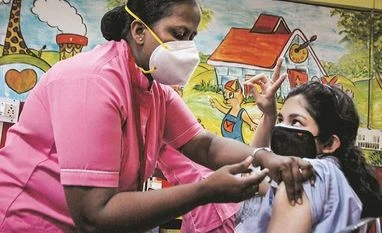"Four - six Covid vaccines including Sputnik-V, which are due to start supplying in the next few months have a shrinking opportunity size with the government's aggressive pre-purchases. These vaccines include Sputnik-V (Dr. Reddy's), Zycov-D (Cadila Healthcare), Covovax (Novavax / Serum Institute), Johnson & Johnson (J&J) Vaccine (J&J/Biological E) and Moderna+Pfizer vaccines if at all,” wrote Abhishek Sharma, an analyst at Jefferies in a recent note.
The research and brokerage house has not included Gennova's mRNA vaccine and Bharat's Intra-nasal vaccine in our potential launch list by end of 2021.
ALSO READ: DRDO invites expression of interest for bulk production of Covid drug 2-DG
That said, Sharma expects only 32 per cent of population to be fully vaccinated by the end of the year given that just 14 per cent of Indian population has been vaccinated till now.
“Leading vaccinators US / UK /Israel are showing signs of plateauing at first dose rate of 52 per cent/60 per cent/60 per cent of population. At these rates, the US / UK / Israel have seen a marked decrease in daily deaths from respective peaks in late Jan-2021. India, with its diverse population and poor infrastructure outside cities, will find it challenging to reach these vaccinated numbers quickly,” Sharma wrote.
On its part, the government has recently set the maximum price that private hospitals can charge for the three Covid-19 vaccines currently available in India -- Covishield Rs 780 per dose, Covaxin Rs 1,410 and Sputnik V Rs 1,145. Private hospitals, the government said, may charge up to a maximum of Rs 150 per dose as service charge.
In the case of the vaccines, the key variable, according to Nomura, is the price that the government will be able to negotiate. The most prevalent vaccine currently, the Serum Institute of India’s Covishield appears to be priced at Rs 300/dose for the government followed by Bharat BioTech’s Covaxin at Rs 400/dose (although both had supplied the initial batch of vaccines to the central government at a lower price of Rs 150/dose).
“Assuming that the government targets 75 per cent of the 18 year old+ population, we estimate that the fiscal cost of vaccination could be close to Rs 49,000 crore versus the government’s budgeted Rs 35,000 crore, suggesting additional spending of Rs 14,000 crore (nearly 0.06 per cent of GDP) over the budget estimate,” wrote Sonal Varma, managing director and chief India economist at Nomura, in a recent co-authored note with Aurodeep Nandi.
ALSO READ: Over 13.3 mn Covid vaccine doses still available with states: Centre
Distribution of free food / ration till November, according to Nomura, is likely to add another Rs 65,000 crore to the overall cost, leading to an overall free food outlay for the year of a little over Rs 90,000 crore (around 0.4 per cent of GDP).
“While these measures are growth positive, they suggest an increasing risk that the central government’s fiscal deficit target of 6.8 per cent of GDP in FY22 will slip (year ending March 2022). This could weigh on India’s sovereign ratings prospects, when they are most likely due for a review towards the end of the year or early next year,” Nomura cautioned.
To read the full story, Subscribe Now at just Rs 249 a month
Already a subscriber? Log in
Subscribe To BS Premium
₹249
Renews automatically
₹1699₹1999
Opt for auto renewal and save Rs. 300 Renews automatically
₹1999
What you get on BS Premium?
-
Unlock 30+ premium stories daily hand-picked by our editors, across devices on browser and app.
-
Pick your 5 favourite companies, get a daily email with all news updates on them.
Full access to our intuitive epaper - clip, save, share articles from any device; newspaper archives from 2006.
Preferential invites to Business Standard events.
Curated newsletters on markets, personal finance, policy & politics, start-ups, technology, and more.
Need More Information - write to us at assist@bsmail.in
)